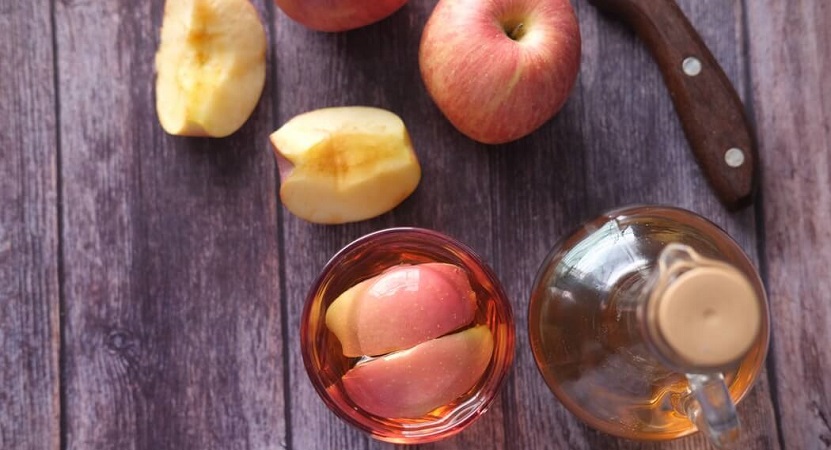As if apple cider vinegar weren’t impressive enough when it comes to all things self-care, we’ve got one more use to add to the list. Ever heard of an apple cider vinegar hair rinse? Yes or no, you want to stick around for this one!
In this article we discuss the following:
- What is a Hair Rinse?
- Apple Cider Vinegar Benefits
- Apple Cider Vinegar Hair Before and After
- Apple Cider Vinegar Hair Rinse Brands
- How to Wash Your Hair with Apple Cider Vinegar
- How to Make Apple Cider Vinegar Hair Rinse
What is a Hair Rinse?
Whenever one refers to a hair rinse, know that it is directly intended to bring benefit to the individual involved. What we mean by this is that there are many different ways of performing a hair rinse, using various different products and ingredients.
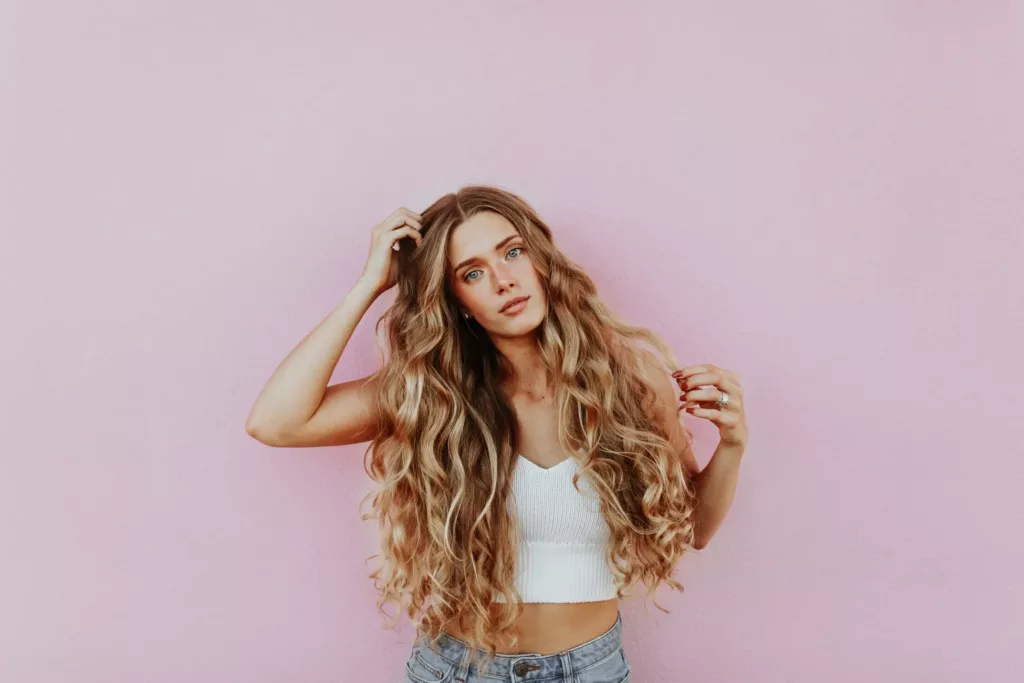
Hair rinses are intended to wash certain products through the hair so that a treatment effect can be experienced. This could be anything from a chemical based product, to a natural or plant-derived ingredient that is known for having properties that benefit human hair.
Hair rinsing is a fairly new trend in terms of mainstream care rituals, but certain communities and groups have observed this technique for what seems like eons. There are ritualistic forms of hair rinsing found in a number of cultures, including ancient Indian and Native American.
Today, there is one ingredient that is making headlines for hair rinse enthusiasts worldwide is none other than good old ACV. Apple cider vinegar has its place in natural beauty and skincare, and is renowned for its healing properties both inside and outside the human body.
We intend to fully dissect this phenomenon, and get to the bottom of this trend that is now even being bottled and sold off commercially.
Is Vinegar Good for Your Hair?
The majority rules, and apple cider vinegar hair treatments have been widely dubbed perfectly suitable for use on human hair of all types. Amir Behrozi is the founder of My Home Dojo, and supports this claim, stating that “An apple cider vinegar hair rinse is good because it can restore the pH balance of your hair. It also helps make the hair fuller, softer and shinier, as it seals in moisture.”
From a biochemical perspective this makes complete sense, as vinegar is known for being a potent pH stabilizer in a wide range of contexts. Behrozi goes on to explain that “Vinegar attracts and retains natural oils otherwise washed away by shampooing from our locks. Some people find that apple cider vinegar works better for them than other shampoos because their scalps become so dry after washing–vinegar rinses help open up the pores or follicles again.”
More intriguing science, but what else does one need to know before turning to this kind of treatment?
What Does Vinegar do to Your Hair?
Will Vinegar Dry Out My Hair?
Just about everyone is familiar with household vinegars, and the drying out effect they can have on foods, the skin and even surfaces when used abundantly. It would only be logical to ponder what effect apple cider vinegar would have on hair, especially if one considered their own mane to be of somewhat delicate nature.
As our friend Amir stated in the aforementioned section, ACV is surprisingly the opposite of drying on human hair. It won’t have any effect on the natural oils present in the scalp, and will actually help amplify them to keep your hair moisturized and less dry!
Emma Miles, co-founder of Pawsome Advice, told us of her own personal plight with dry, damaged hair. “I suffer from dandruff, which is caused by a lot of factors, including a dry scalp and certain kinds of fungus. My hair was dry and brittle from all the product and heat that I would apply to it.”
Out of options, Emma decided to try out the apple cider vinegar hair rinse she’d read about. “Apple cider vinegar nourishes the hair and scalp with vitamins and minerals and also exacts its anti-inflammatory properties against bacteria that cause itchiness. It’s a quick and natural remedy that could clear up your hair in a few minutes, so it’s worth at least a shot.”
Can Vinegar Damage Your Hair?
You wouldn’t be alone in pondering the side effects of vinegar on hair. This is a concern that everyone has before they try their luck with the treatment.
We figured this question would be best answered by someone who knows more about hair than the average person. Monica Davis is a professional hairstylist and founder of MyStraightener blog. According to Monica, apple cider vinegar is generally a very good remedy for restoring the balance in your hair. However, she acknowledges it can also be quite harmful if you overdo it. “Despite all its benefits, vinegar is a harsh chemical liquid with a lot of caustic acetic acid. It can simply burn or irritate your skin if you overdo it by accident.”
Monica notes that mixing and applying this kind of hair rinse with care and precision, is the key to avoiding an harsh side effects. She does caution that ACV is particularly painful when it leaks into the eyes, so this is something you also want to be extra careful about.
Read on and we’ll share Monica’s ACV rinse ratio toward the end of the article!
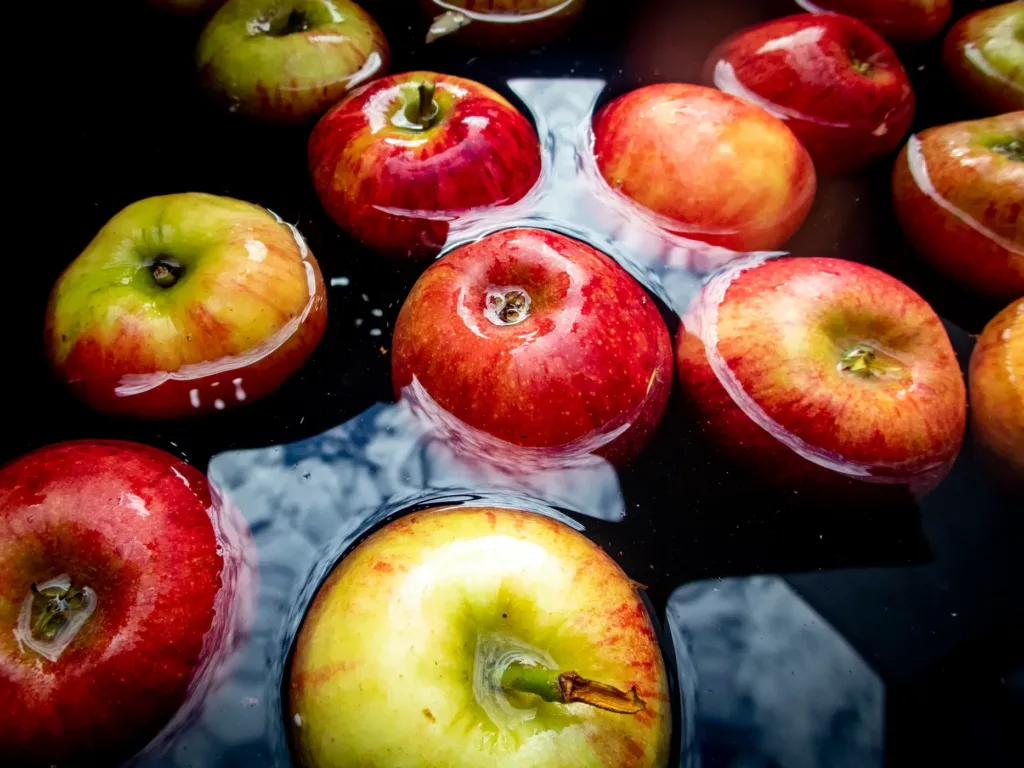
Apple Cider Vinegar Benefits
We’ve touched on a few notable effects that comes from an apple cider vinegar clarifying rinse, but what are the more extensive longterm benefits?
Jenny Stokes is a beauty expert and founder/CEO at Minimal Japan. She lists three main benefits in using raw apple cider vinegar for hair: Growth, protection and exfoliation.
According to Stokes, “ACV is said to encourage hair growth because of its ability to keep a
balanced pH level. It is also useful in unclogging pores that may prevent hair sprouts.” Moving on to protection, “The enzymes of ACV are claimed to make hair shiny and smooth. It prevents color pigment loss and is useful in taking care of hair cuticles and other parts of the hair strand.”
Finally, in terms of exfoliation, “ACV has a lot of minerals in it. It contains alpha-hydroxy acid which helps in clearing dead skin cells in the scalp. Its antibacterial and antifungal properties also help in removing dandruff.”.
Apple Cider Vinegar for Hair Loss
In the beauty world, preventing hair loss and promoting hair growth are two very different objectives that are often confused for being the same thing. A person who is experiencing increased hair fall may not be concerned with growing new hair; they simply want to prevent the loss of their existing locks.
As we know, using ACV on hair works to rebalance any pH levels that are not sitting within a healthy region. This usually means that dry, brittle and easily breakable hair is restored back to good health, and hair loss is naturally reduced.
A 2014 apple cider vinegar hair loss study showed how products used on hair usually directly affect the pH balance of the follicles, which thus influences breakage and hair loss levels. Incorporating apple cider vinegar into your hair care routine could be the most important change you make in addressing your hair loss woes.
Apple Cider Vinegar for Scalp
Apple Cider Vinegar for Itchy Scalp
An itchy scalp usually means that something is out of balance; namely your pH, oil levels or simply your scalp moisture. One can generally consider an itchy scalp to be your body’s way of alerting you to an ongoing problem, one that is likely going to continue to escalate if you don’t make changes soon.
Using apple cider vinegar and essential oils for hair can quickly remedy the symptoms of an itchy scalp, and possibly prevent the condition from worsening to the point of active dandruff or hair loss.
Scalp itching is usually directly related to a lack or imbalance of sebum in each hair follicle, which we now know can be regulated using a carefully measured ACV mixture.
Apple Cider Vinegar Hair Rinse for Colored Hair
We’d like to refer back to the words of Jenny Stokes, who explained earlier how ACV positively affects dyed hair. “It prevents color pigment loss and is useful in taking care of hair cuticles and other parts of the hair strand.”
Few people are convinced when it comes to apple cider vinegar hair color. They assume that the vinegar is so high on the acidity scale, it can’t be good for any kind of pigment treated hair. This is actually far from the truth, given that ACV isn’t quite as acidic as most people think.
Adria Marshall tells us that “Apple Cider Vinegar is acidic, with a pH between 2-3”, however this is simply not acidic enough to strip permanent or temporary dyes from human hair. It is enough, however, to keep our scalp’s pH in balance, says Pressey, “Our scalp should maintain a pH between 4.5 and 5.0. When its pH gets out of whack, bacteria and fungus can grow, causing all sorts of issues.”
Apple Cider Vinegar for Hair Growth
As mentioned, hair growth and hair loss are two different objectives that don’t necessarily have to be mutually exclusive. Using a properly measured apple cider vinegar hair growth recipe can offer great benefit to someone who has been struggling to get their locks past a certain length.
The balancing of the scalp’s pH really is the key. Hair grows when it is in a state of strength and protection, not when it is in a state of distress. Balancing the pH of the scalp is the fastest way to tell the body that it is safe and ready to spare some energy on hair growth, as opposed to using all of it’s resources trying to balance and rebalance the ever-changing condition of the hair.
Apple Cider Vinegar for Curly Hair
This is a tricky subject, due to the very unpredictable nature of curly hair in general. Anyone with curls will tell you that their hair seems to have a personality of its own, which involves mood swings from time to time. Product usage on curly hair usually has to be person-specific, and it’s important to note that not all curly hair enjoys a ACV hair rinse.
If not properly diluted, apple cider vinegar could send your curls into distress. However, when used properly, this formula could actually offer great benefit in terms of volume and curl definition!
We recommend mixing up a light apple cider vinegar spray for hair, and using it as you would any other curl-maintenance spray.
Apple Cider Vinegar for Hair Dandruff
When an itchy or dry scalp is left untreated, things will usually escalate to active dandruff. Fortunately, apple cider vinegar seems to be a worthwhile treatment for this condition, and many health care professionals agree!
Dr. Carrie Lam supports raw, organic apple cider vinegar as being one of the most popular natural dandruff remedies. “Vinegar is rich in malic acid, which gives unripe apples their sour flavor. Malic acid is a type of alpha hydroxy acid, an all-natural chemical exfoliant that helps exfoliate your skin to get rid of dead skin cells and reveal healthier smoother new skin. This can help to eliminate the skin flakes commonly attributed to dandruff.”
Dr. Lam goes on to cite a study at Berkeley Center for Environmental Research and Children’s Health. They found that applying apple cider vinegar to your skin also helps remove dirt and oil, and can thus help to reduce scalp irritation, get rid of itching and soothe away dandruff.
“The acidic nature of vinegar may also help to control fungus and yeast overgrowth, which is helpful if such overgrowth is one of the contributing factors in your dandruff problems.” Says Dr. Lam.
Apple Cider Vinegar Rinse for Locs
Dreadlocks are wonderful subjects for a regular apple cider vinegar rinse. It is recommended that one make time for this kind of treatment between 2 to 4 times per year, in order to keep locs refreshed, moist and strengthened.
Despite their rough exterior, dreadlocked hair is actually very sensitive and impressionable. It needs care and regular attention, just like other types of hair. This means that locs are not exempt from the potential side effects involved in using ACV so close to the scalp. Be considerate with ratios and don’t over do it! You don’t want a vinegar burnt scalp carrying the weight of the locs in the proceeding days.
Apple Cider Vinegar Hair Before and After
The proof is in the pudding, as they say, and the best way to determine whether a ACV hair rinse is for you or not, would simply be to try it out. That said, there are a plethora of personal reviews and testimonials available online from people around the world who are giving this treatment a chance to impress.
Since all hair is different, and tends to adapt to external conditions (environmental factors), one can never guarantee that their experience with a specific treatment is going to be exactly the same as another’s.
Here are some before and after images from different parts of the world:
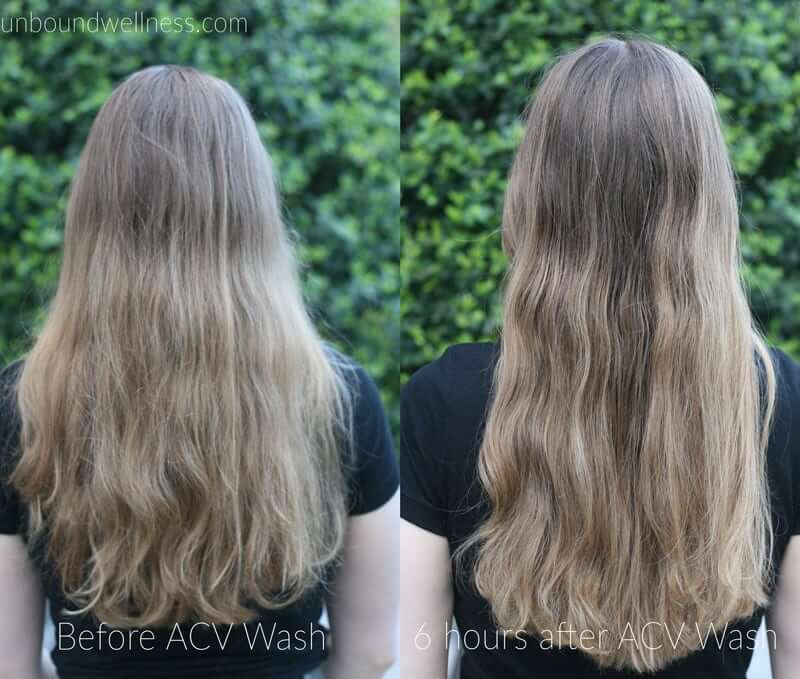
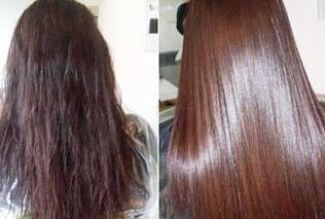
Apple Cider Vinegar Hair Rinse Brands
Dphue Apple Cider Vinegar Hair Rinse
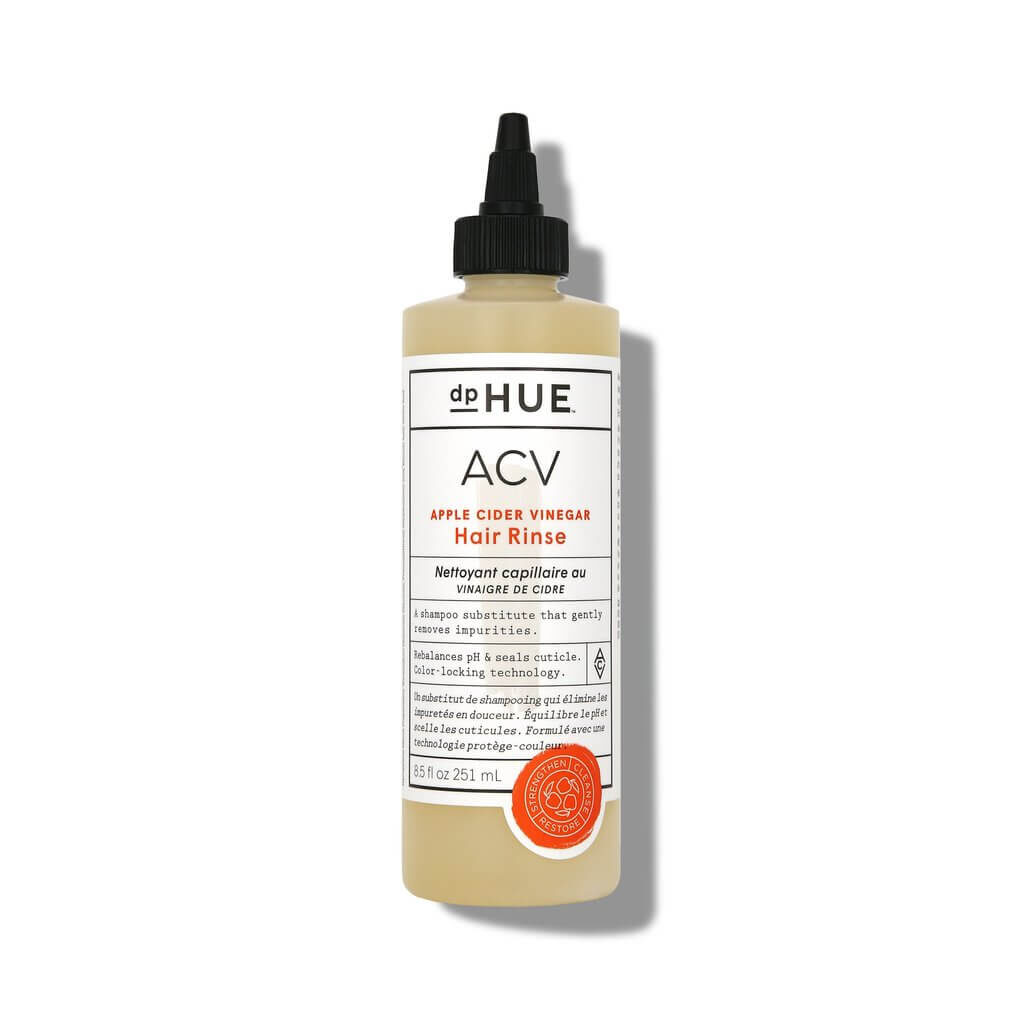
If ACV is so accessible in every household, why would one need to turn to a beauty brand to purchase? This is a question we pondered long and hard before looking into the brands that are now selling bottled apple cider vinegar as haircare and not for cooking purposes.
What we found was that while ACV is fully accessible in the grocery isle for a fraction of the price, we also need to keep in mind that raw, undiluted apple cider vinegar is not suitable for a hair rinse as is. It needs to be properly measured out and mixed with a carrier before it can be applied to hair, and a lot of people may not have faith in themselves to get it right (or perhaps just the energy to DIY it).
Brands, like dpHUE that are selling ACV rinses by the bottle, have taken the time to properly ratio the vinegar into various carrier agents. This particular brand goes further, and adds beneficial oils such as lavender, argan and aloe vera; all of which offer additional protection, moisture and soothing to the scalp.
At $35 a pop, this can feel a little steep for first timers. After trying it out, we’d say its worth the splurge, and will last just as long as your regular shampoos and conditioners, if not longer (remember, this is not a treatment you should do more than once a week!).
Pureology Vinegar Hair Rinse
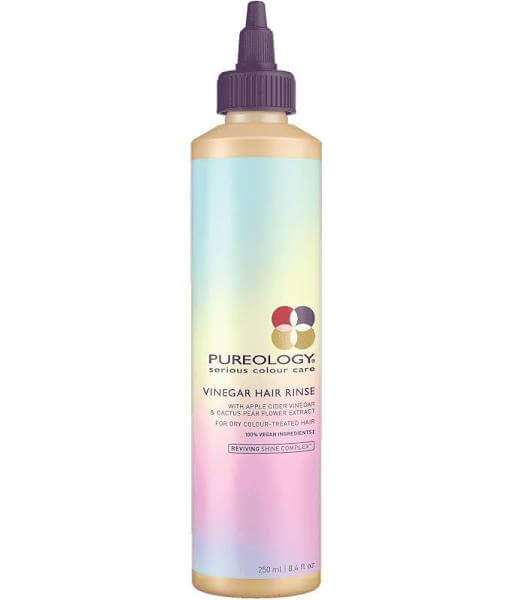
The Pureology vinegar hair rinse is on par with the aforementioned product in terms of quality and performance, but this one is a little more geared toward color treated hair!
As discussed previously in this article, we know that even in its purest form, ACV is not acidic enough to ever strip dye from hair, so even if you make your own mix at home there is no risk of this happening.
That said, this rinse is made by color professionals who understand that there is more to hair treatments than just “at least it didn’t strip my hair”. What if this rinse could actually strengthen your color bonds and make the tones more vivacious in the process?
Pureology’s rinse is paired with cactus pear flower extract, which lends to its gentleness on dyed strands. The formula helps remove product buildup, oils & impurities while protecting hair’s natural oils. For anyone seeking a level up in hydration, this is the brand to look at.
How to Wash Your Hair With Apple Cider Vinegar
How then, does one go about an ACV hair rinse? There are different ways of treating hair in this way, some people even opt to leave apple cider vinegar in hair overnight, while others prefer a less lengthy timeline.
There is no telling if leaving ACV in overnight it more beneficial than an instant rinse. Different strokes for different folks, you know?
Apple cider vinegar rinse before or after conditioner? The important think to know is that you need to properly shampoo and condition your hair prior to any kind of rinse. An apple cider vinegar hair rinse is not a substitute for washing and conditioning; you still need these two elements as you usually would.
After your washing regime, your hair should be towel dried, and then the hair rinse can commence.
How Long to Leave Apple Cider Vinegar on Hair
So your hair is wet and towel dried, and you’re ready to apply the formula. Gently pour your ACV mix through your locks, allowing it to run from the scalp down into the hair follicles. Use your fingers to move the mixture through each strand, ensuring that all areas are properly coated.
Next question: how long does one leave this mixture in for exactly? We’ve found it depends largely on the hair in question, but for the most part you’ll only need to leave the ACV in your hair for up to 5 minutes. This is all the time it takes for the chemical reactions between the vinegar compound and the hair to start working together.
After 5 minutes, the mix will start to weaken until it is eventually just a neutral compound with no more reactive benefits. That said, there are certain apple cider vinegar leave in hair treatments that will require you to leave the mixture overnight, or even just for a couple of hours. Always follow the instructions of the specific brand you have chosen, or apply the 5 minute rule to your homemade formula!

How to Make Apple Cider Vinegar Hair Rinse
Apple Cider Vinegar Hair Rinse Recipe
If you’re wondering can I wash my hair with apple cider vinegar in a formula that I make myself? The answer is yes! A homemade vinegar hair rinse can get the job done just as well (if not better) than store-bought alternatives.
We promised we’d share the secrets to this hair rinse from the mind of Monica Davis, so here goes: According to her, there is a right way, and aw wrong way, to DIY apple cider vinegar hair rinse. Here’s how to apply it the right way:
- Add 2 tablespoons of vinegar to a gallon of warm water
- Shampoo and condition your hair
- Rinse your hair thoroughly with the vinegar/water mix
- Leave it on your hair for 1-2 minutes
- Thoroughly rinse your hair with warm clean water
Dr. Ailynne Vergara, Clinical Dermatologist and researcher with Thank Your Skin, supports a good rinse, but jumped in with some words of warning for anyone attempting to try this at home. There are certain things to watch out for when using apple cider vinegar on the scalp, and Dr. Vergara acknowledges that this treatment is all about bringing hair back into balance. “If you’re not careful, it can be overdone.” She lists some points to watch for throughout the process:
- If your hair or scalp issues worsen instead, discontinue using ACV. Or, try lowering the amount you put into a rinse, or the frequency you use it.
- Apple cider vinegar contains acetic acids known to be caustic. This means they may irritate or burn the skin. Always dilute ACV with water before applying it directly to the skin.
- If your rinses are too strong, try diluting it more — though if irritation happens, it almost always clears up within a couple of days.
- Avoid contact with eyes. If contact happens, quickly wash out with water.
Pursue the above guidelines and using apple cider vinegar can be deemed completely safe, says Dr. V!
Ratio of Apple Cider Vinegar to Water for Hair Rinse
As stated above, ratio is of the utmost importance when mixing a hair rinse at home. To keep things really gentle and risk-free, one should stick to the 2 tablespoons to 1 gallon of water ratio.
For those looking for a slightly more potent rinse, try a 5 parts water to 1 part vinegar ratio, mixed in a small spray bottle that can guide the treatment across the hair bed.
If you want a strong rinse (once in a while), try 2 parts vinegar to 5 parts water. We wouldn’t suggest going any higher than this without testing it out on a small part of the scalp for sensitivity or reactions.
Did You Enjoy This Article?
If you enjoyed this article, you might also like our articles discussing haircare and skincare such as Houttuynia Cordata (Heartleaf) and Skincare, Apple Cider Vinegar Shampoo, and Fungal Acne (Malassezia Folliculitis).

